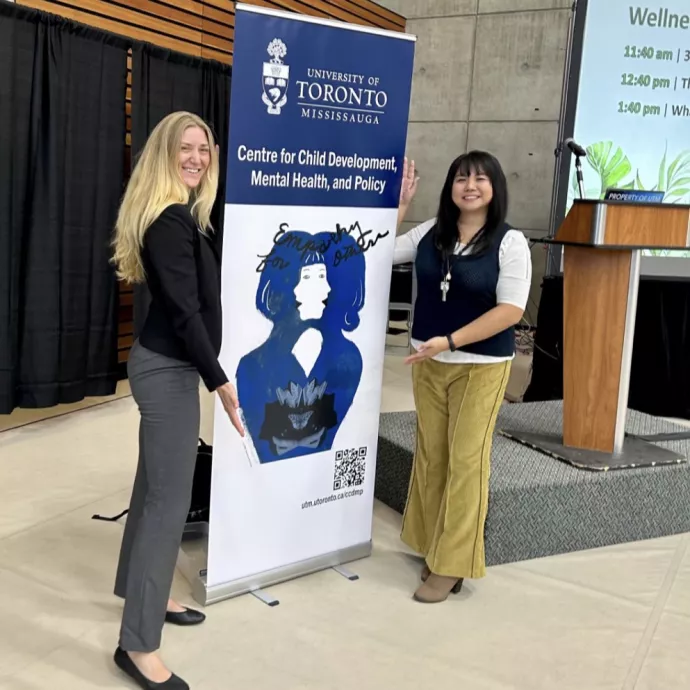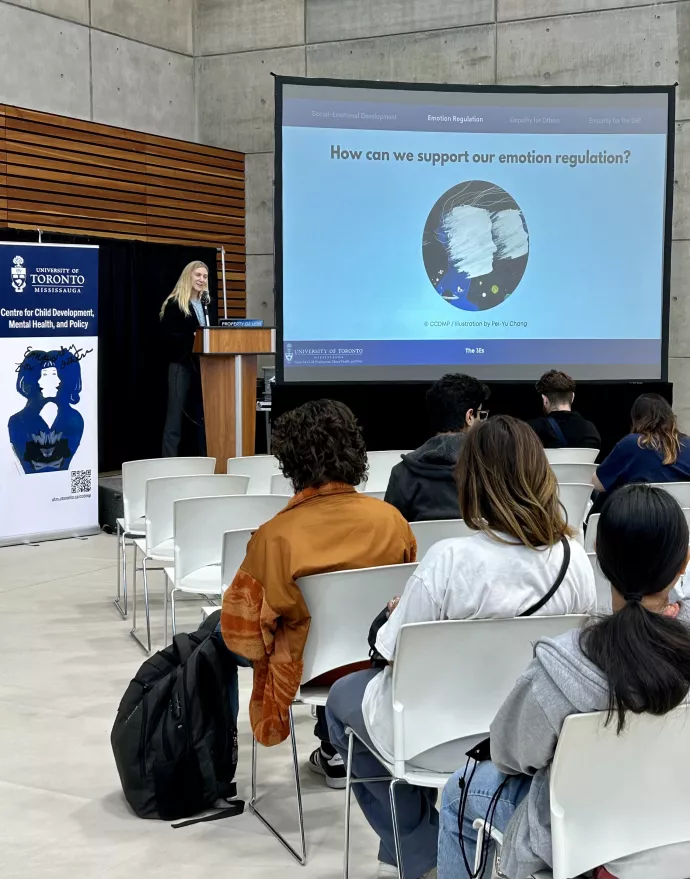
Student Wellness & Mental Health
Dr. Ruthie Speidel, professor of psychology and Managing Director of the CCDMP, spoke at the 6th Annual Be Well UTM Resource & Activity Fair hosted by UTM’s Health & Counselling Centre on September 21, 2023. The event was open to all UTM students, staff, and faculty and included art and other interactive activities for students, information booths from various campus supports and community organizations, and wellness talks.
Dr. Speidel spoke about The 3Es of Wellbeing and how students can care for their own wellbeing during times of stress and uncertainty. Based on the CCDMP’s research, The 3Es of Wellbeing is adapted from our training program focusing on the promotion of emotion regulation and empathy:

Emotion Regulation
What is it? Emotion regulation is being able to manage our emotions, so they do not overwhelm but rather help us live healthy, happy lives. It can be other-guided (talking to a friend to calm down) or self-guided (taking some deep breaths).
Why is it important? Emotions can motivate us to make decisions and act, avoid danger, and connect with others. Emotion regulation can help us become more self-aware, positive, increase emotional wellbeing, and even support academic success!
How can students support their own emotion regulation?
-
Check in with yourself (“How am I feeling right now?”) every day.
-
Reach each out to friends and family when you need support.
-
Check out free resources and services available on campus (UTM Health & Counselling Centre, UofT Student Mental Health Resource) and online.
-
Take study breaks (e.g., walk away from the screen and do a few stretches every half hour).
-
Make time for hobbies or try something new.
-
Take a walk around the neighbourhood, or at a park for a dose of nature!
-
Practice mindfulness (try a podcast or YouTube video such as this 10 Minute Guided Meditation for Students, go to a yoga or meditation class, work out).
Empathy for Others
What is it? There are two types of empathy. Emotional empathy is feeling the same emotion as another (“We both got into grad school, this is exciting!”). Cognitive empathy is understanding and evaluating another’s perspective and emotional states (“Their grandfather passed away. That must be so hard.”)
Why is it important? Being able to be empathetic is a large part of emotional intelligence and can drive compassionate action. If we understand others’ point-of-views, we can become kinder people by offering our support. This helps create stronger bonds and promote positive relationships.
How can students increase their empathy for others?
-
Check in with your friends and family in a way they’d like (Would an older relative prefer a call or visit? Does your friend prefer going out for a coffee or staying in?).
-
Read more books for fun!
-
Focus on how and why characters feel the way they do when watching a show or movie
-
Give genuine and specific compliments to others (“Thanks for telling me about the student film fest ticket discount. I love how you remembered that I wanted to see that movie.”).
-
Do a random act of kindness.
-
Don’t be afraid to say no sometimes. If you don’t have the time or capacity, it’s okay and people will understand.
Empathy for the Self
What is it? We often think of empathy as a very other-oriented capacity. But we can and should also show empathy towards ourselves. When we think about having empathy for ourselves, this involves thinking about and reflecting on ourselves with gentleness.
Why is it important? Healthy self-reflection increases our self-awareness and can lead to higher self-esteem. Observing our own morals can also promote healthy guilt, or feelings of sadness or regret after a wrongdoing. Healthy guilt is not the same as shame, which occurs when we link our wrongdoing to our own self-worth or identity, believing, "I did something bad, so I am bad.". Feelings of healthy guilt reflect an underlying self-kindness because these feelings occur when we recognize that our actions do not match up to our standards for ourselves and because these feelings often propel us to repair and fix the harm caused.
How can students support self-empathy?
-
Take social media breaks.
-
Keep a journal or take a moment during the day to reflect on what is happening and how you’re feeling, and to remember the positive moments.
-
Be open to really listening to your feelings as well as to others.
-
Apologize when you are wrong.
-
Be gentle with yourself when you make mistakes. It happens. Fix it, learn from it, move forward with kindness.
Mental health is health, so it is important that we take care of our minds and body every day to stay healthy and strong. Just as we rely on medical professionals, fitness guides, physical therapists, and others to help motivate us and support our physical health, reaching out for support for our mental and emotional health regularly, not just in an emergency, should be normalized too.
What do you do to support your mental health? What works well for you?
Follow @UTM_CCDMP on social media for more tips and the latest on child and youth mental health and development. Subscribe to our mailing list here.
